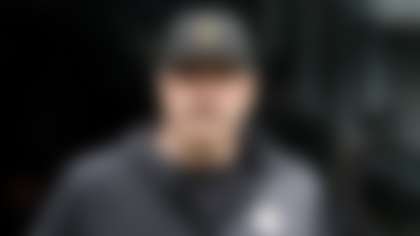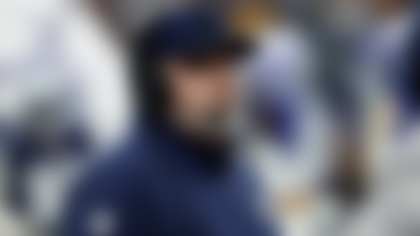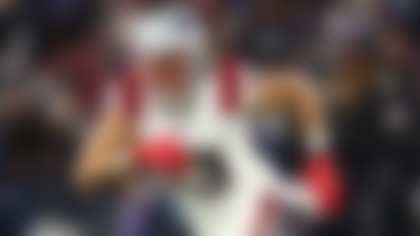NEW YORK -- Former Patriots video assistant Matt Walsh disclosed no new rules violations in the videotaping scandal during his meeting with NFL Commissioner Roger Goodell on Tuesday.
The NFL also released the tapes Walsh provided, shown after his nearly 3½-hour meeting with Goodell. The clips didn't show any previously undisclosed rule violations, cutting between shots of opposing coaches sending in signals and the play that followed.
"The fundamental information that Matt provided was consistent with what we disciplined the Patriots for last fall," said Goodell, who didn't anticipate punishing the team any further.
Walsh did not comment after leaving the NFL offices and left through a different exit to avoid the media following his afternoon meeting with Sen. Arlen Specter in Washington. Specter, the senior Republican on the Senate Judiciary Committee, has been critical of the NFL's handling of the investigation.
Specter postponed his scheduled news conference to 12 p.m. ET Wednesday after his meeting with Walsh ran long. Walsh is not expected to attend.
The investigation surrounding the Patriots videotaping practices began after the NFL confiscated tapes from a Patriots employee who recorded the New York Jets' defensive signals from the sideline during the 2007 opener. New England coach Bill Belichick was fined $500,000, while the team was fined $250,000 and forced to forfeit its 2008 first-round draft choice.
Asked if he considered the matter closed, Goodell said, "As I stand before you today, and having met with Matt Walsh and more than 50 other people, I don't know where else I would turn."
Walsh had no knowledge of anybody with the Patriots taping the Rams' final walkthrough before the 2002 Super Bowl, Goodell said. The Boston Herald reported in February that an unidentified employee illegally taped the walkthrough before New England, a two-touchdown underdog, upset St. Louis 20-17.
The Patriots released a statement following the press conference, addressing the alleged walkthrough tapes.
"For the past three-and-a-half months, we have been defending ourselves against assumptions made based on an unsubstantiated report rather than on facts or evidence," said the statement. "Despite our adamant denials, the report ran on February 2, 2008, the day before Super Bowl XLII.
What was on the tapes?
</center>[!](http://www.nfl.com/teams/newenglandpatriots/profile?team=NE) Here are the games included in the tapes turned over by Matt Walsh to the NFL, according to a letter sent by Walsh's attorney, Michael Levy:
Tape 1: Signals vs. Miami (Sept. 25, 2000) -- The tape is labeled Sept. 25, but the actual game was on Sept. 24. That day in Miami, the Patriots lost to the Dolphins, 10-3, and dropped to 0-4. New England also lost its season finale to Miami, 27-24, on Christmas Eve. The Patriots finished 5-11.
Tapes 2-3: Miami defensive and offensive signals (Oct. 7, 2001) -- The Patriots lost 30-10 at Miami. The Pats gained 149 total yards and fell to 6-14 overall under Belichick (they're 99-26 since). In a Dec. 22 rematch, the Pats gained 313 yards and didn't commit a turnover, winning 20-13 to improve to 10-5. Miami had three turnovers.
Tape 4: Buffalo signal camera (Nov. 11, 2001) -- The Patriots beat the Bills 21-11 to improve to 5-4. The Patriots were outgained in the game, 242-205. In the rematch at Buffalo on Dec. 16, the Patriots won 12-9, and outgained the Bills, 335-310.
Tape 5: Coaches' signals vs. Cleveland (Dec. 9, 2001) -- The Patriots won 27-16. New England barely outgained the Browns, 290-277. The Browns, however, turned the ball over four times. The teams didn't play again until Oct. 26, 2003, when the Patriots won 9-3.
Tapes 6-7: Signals vs. Pittsburgh (Jan. 27, 2002) -- In the AFC Championship Game at Pittsburgh, the Patriots were nine-point underdogs, and Tom Brady was knocked out with an injured leg in the first half. However, Drew Bledsoe came in and led the Patriots to a 24-17 win, thanks to a Troy Brown 55-yard TD punt return and a 60-yard return of a blocked FG for a TD. The Patriots intercepted Steelers QB Kordell Stewart three times, and Pittsburgh running backs were held to just 19 yards.
Tape 8: Third camera vs. San Diego (Sept. 29, 2002) -- New England lost at San Diego 21-14, its first loss of the season after a 3-0 start. Despite the loss, the Pats outgained the Chargers, 440-342. New England didn't play San Diego again until Oct. 2, 2005 and lost 41-17.
"That game was the second-most watched program in television history and it is unfortunate that today's news will not also reach an audience of that size. We hope that with Matt Walsh's disclosures, everyone will finally believe what we have been saying all along and emphatically stated on the day of the initial report: 'The suggestion that the New England Patriots recorded the St. Louis Rams' walkthrough on the day before Super Bowl XXXVI in 2002 is absolutely false. Any suggestion to the contrary is untrue.'"
But a new revelation emerged related to that walkthrough: Walsh said a Patriots assistant coach asked him what he saw.
Walsh was in the stadium in his Patriots gear setting up equipment during the walkthrough, Goodell said. NFL officials noted that it's common for personnel not connected to the team to be present on that day.
Walsh told Goodell that then-New England assistant Brian Daboll approached him later, said NFL attorney Gregg Levy, who attended the meeting. Walsh said he told the coach that running back Marshall Faulk was returning kicks and described the Rams' use of tight ends in their formations. Daboll did not mention the conversation when he was interviewed by NFL officials about the walkthrough, Levy said.
Rams spokesman Rick Smith declined comment.
Goodell made no mention of the incident during his news conference. He realized the oversight later, Levy said, and asked Levy to share the information with reporters.
The NFL is looking into that allegation, said Levy, who attended Tuesday's meeting.
Goodell said Walsh had no information about any other spying by the Patriots.
"There was no bugging of locker rooms," Goodell said. "There was no manipulation of communication systems. There was no crowd noise violations anywhere that he was aware of. No miking of players to pick up opposing signals or audibles."
Walsh did share two potential violations of league rules unrelated to videotaping, Goodell said. A player on injured reserve practiced when he wasn't allowed to in 2001. Walsh also scalped eight to 12 Super Bowl tickets for Patriots players over two seasons. The NFL will investigate both claims.
Last week, Walsh sent the NFL eight videotapes of the Patriots recording play-calling signals. The tapes included signals by coaches of five opponents in six games from 2000-02.
Walsh worked for New England from 1997 to 2003. His name surfaced just before this year's Super Bowl, nearly five months after the Patriots were sanctioned.
After more than two months of negotiations, lawyers for the league and Walsh finally agreed April 23 to terms that would allow him to talk with Goodell. They include an agreement by the Patriots not to sue Walsh and to pay his legal expenses and his airfare to New York from Hawaii, where he is now a golf pro.
Specter, from Pennsylvania, met with Goodell in February after raising the possibility of congressional hearings if he wasn't satisfied with the commissioner's answers about the handling of the investigation. Specter also had criticized the NFL's decision to destroy the tapes it initially confiscated.
Why did Goodell show Walsh's tapes Tuesday but not do the same with the others last fall? He said releasing them during the season could have put some teams at a competitive advantage or disadvantage.
Walsh stood stone-faced as his lawyer, Michael Levy, addressed a throng of about 50 media members outside the NFL offices after their meeting with Goodell.
"Out of respect for Sen. Specter, neither Mr. Walsh nor I will speak with the media prior to meeting with the Senator," Levy said.
Copyright 2008 by The Associated Press



